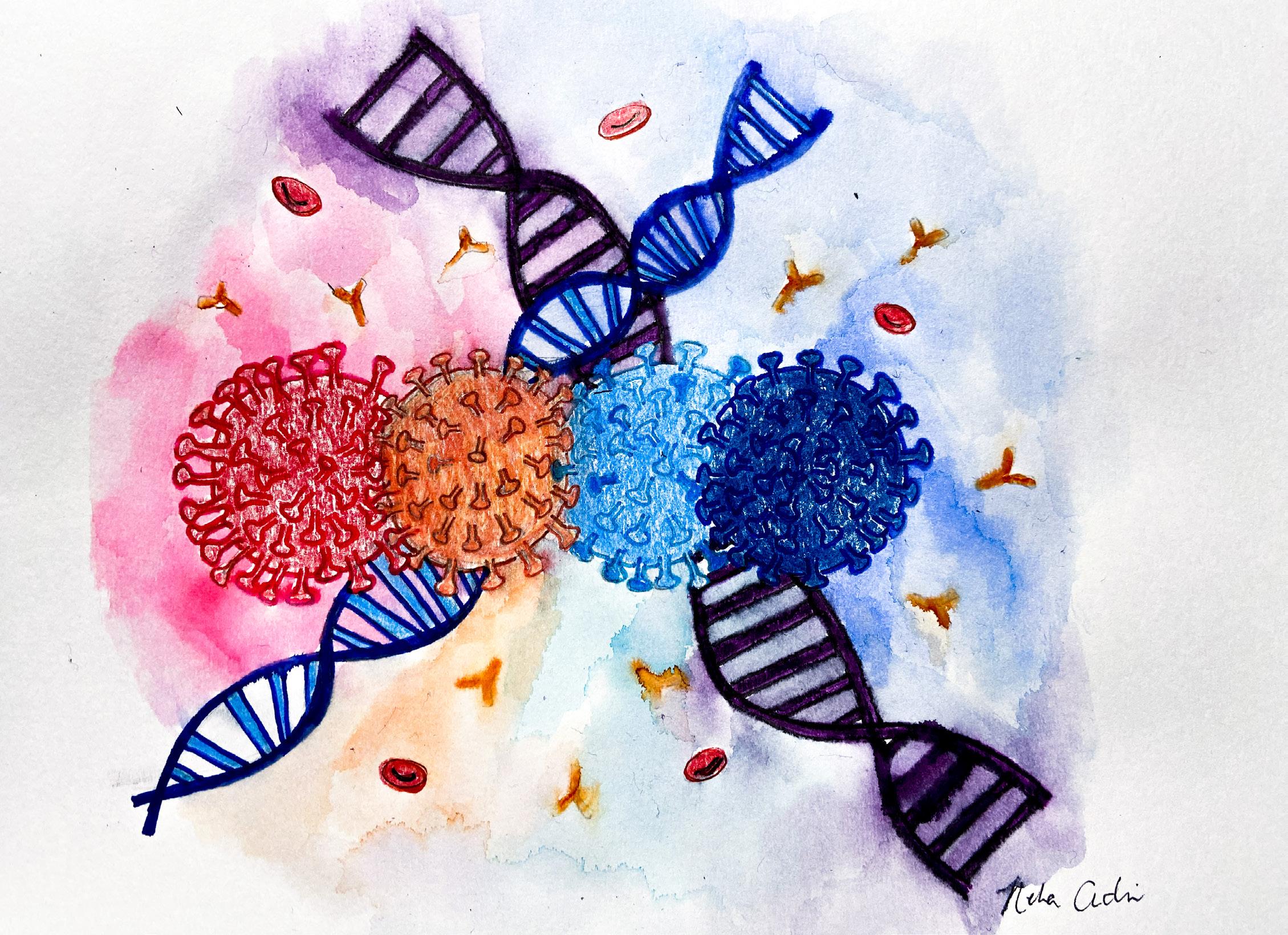
4 minute read
A Race Between COVID 19 Variants and Vaccines: How the Mutating Virus has Impacted Vaccination Efforts and Effectiveness
Writer: Pooja Shah • Editor: Caelan Miller
The first COVID-19 case was reported over one year ago in Wuhan, China on December 31, 2019. Since then, the virus has reached every continent with over 98 million reported cases and two million deaths [6]. As cases have been rising in record time, vaccine development and clinical trials have been simultaneously progressing due to a heightened urgency to get the pandemic under control. Over a year after the first case of COVID-19, we now possess numerous vaccines that have been granted emergency use authorization by the FDA. Just as vaccine distribution has begun, three new variants of the virus have been identified in Brazil, South Africa, and the United Kingdom [4]. These variants have raised widespread concern regarding the efficacy of the current vaccines in response to the new strains potentially causing people to experience a second round of COVID-19.
Advertisement
It may appear that we are now back to where we began due to the emergence of these new variants; however, the key difference is the arsenal of vaccines at our disposal. The discovery of the new variants of coronavirus raises an important question: How effective are the current vaccines in building immunity towards these three new variants? Clinical trials have been underway to better understand how these mutations affect the efficacy of the current vaccines. In order to better understand the levels of immunity the vaccine provides from the new variants, it is first important to understand how the vaccine works.
The Pfizer-BioNTech and Moderna vaccines utilize a recombinant spike glycoprotein generated from mRNA [6]. The CDC explains that mRNA vaccines provide instructions to our cells to make a spike protein [1]. A spike protein is found on the surface of the virus that causes COVID-19. By generating this protein upon the mRNA vaccine, our immune system is able to recognize that the protein doesn’t belong there and it starts to build an immune response by generating antibodies, simulating what happens in natural infection against SARS-CoV-2. Through the administration of this type of vaccine, the body is able to learn how to protect against future infection, without facing the risks and consequences of being naturally infected by COVID-19.
With the three new variants of the virus, researchers are focusing on studying how effective the current mRNA vaccines are in preventing reinfection. In a recent study, researchers from Pfizer, BioNTech and the University of Texas Medical Branch studied how effectively blood taken from people who had received the companies’ vaccines fought off a virus that was engineered to have the main mutations found in B.1.351 (South Africa) , B.1.1.7 (United Kingdom) and P.1 (Brazil) [5]. The two vaccines developed by Pfizer-BioNTech and Moderna appeared to be very effective against the variant of the virus first detected in the UK. The study also indicated a decreased efficacy of the vaccine towards the variant first discovered in South Africa. They reported a two-thirds drop in neutralization power against the variant compared to other variants of the SARS-CoV-2 coronavirus [5]. From the results alone, it is relatively difficult to extrapolate what would happen to someone who was vaccinated and potentially exposed to one of the SARS-CoV-2 variants. A limitation of the study was that it focused primarily on neutralizing antibodies, not accounting for how other branches of the immune system would react to the variants. Vaccines are capable of generating a range of different antibodies and T-cells, so it is possible that other avenues of the immune system can play a role in generating an immune response, even if the effectiveness of the neutralizing antibodies is reduced. It is likely that the virus will continue to mutate based upon the intrinsic high error rate of RNA replication, which is worrisome to researchers and vaccine providers alike. In response, Pfizer and BioNTech recently announced they were in the process of developing a booster shot or updated vaccine to address the concern these variants have created [2]. Based on the data provided by studies thus far, researchers speculate that even if the vaccines are less effective against B.1.351 or other potential variants, the shots can still protect people from severe COVID-19 symptoms and side effects.
The mutated variants have presented a new challenge and utmost urgency to limit the spread of the virus. In an interview with CNBC, Dr. Mike Ryan from the World Health Organization compared the mutating virus to entering the second half of a football game [3]. He stated that while it doesn’t “change the rules of the game, it does give the virus some new energy” [3]. Hence, limiting transmission by following current public health guidelines is crucial to preventing the virus from rapidly mutating. While the virus mutating is inevitable, the current vaccines provide adequate immunity towards COVID-19. Equitable distributions of the current vaccine and continued clinical research is necessary to keep the new variants from proliferating, requiring equal effort and commitment from all parties involved. •








